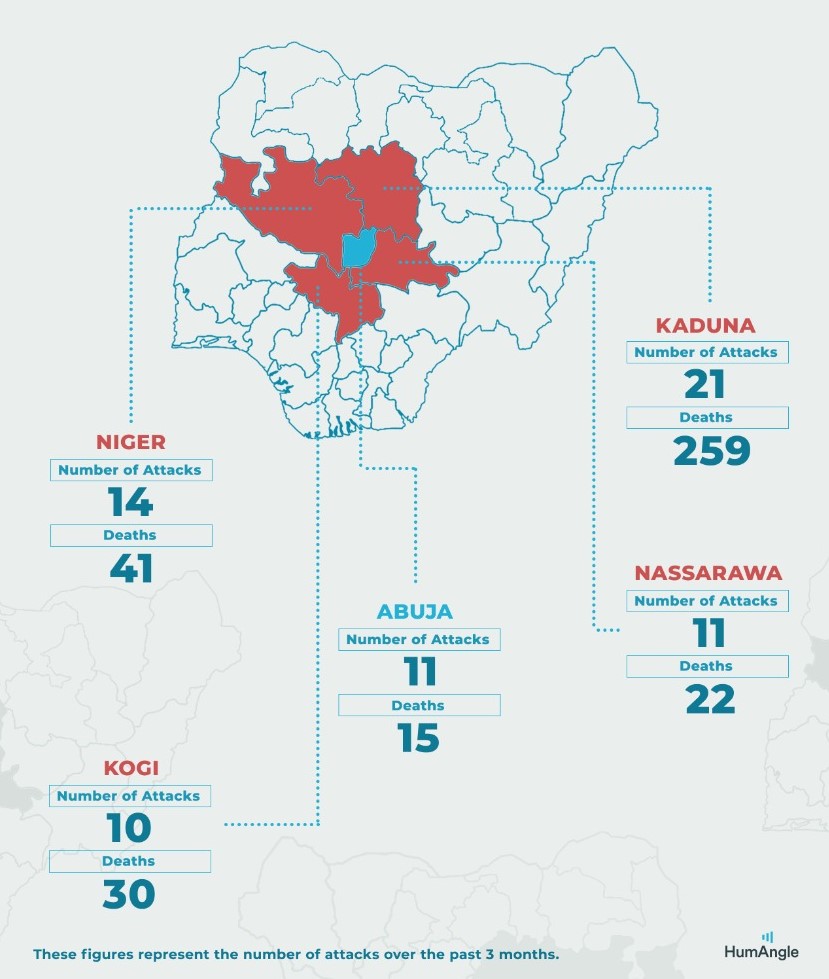Abuja At Risk As Neighboring States Grapple With Violent Crimes – Expert

Insecurity and violence in states surrounding Nigeria’s Federal Capital Territory, Abuja, expose the city to risks of attacks by criminal elements, a security expert has warned.
The states are Niger, Kogi, Kaduna and Nasarwa, each of which faces one form of security threat or another.
In Kaduna State, kidnapping, banditry and suspected Fulani herdsmen attacks in rural areas occur regularly, a situation which prevails in Niger, Nasarawa and Kogi as well.
No fewer than 318 persons were victims of such activities in the three states from May to July, records show.
A security expert, Kabiru Adamu, Managing Director of Beacon Consulting Limited, said the activities had made Abuja vulnerable security-wise due to its proximity to the locations.
He said the hilly terrain of the city could provide ideal hideouts for terrorist sects and criminals.
“Abuja is surrounded by mountainous areas which are very difficult to protect.
“In 2012, when the terrorist sect, Ansarul Islam, attacked Guzape (an Abuja community), they came through mountainous areas and struck,” Adamu noted.
Read Also:
He said the second factor which could lead to the capital city becoming the next hotspot for violence was its large population of unemployed people, which might enable criminality.
“If the current rate of unemployment as well as grievances affecting the communities continues, that kind of environment will also fuel criminality.
“So, basically, as the unemployment rate increases, the grievances within the communities will continue to grow,” Adamu said.
“The rapid increase of the number of internally displaced persons from the north has also played a role in putting Abuja in a position of vulnerability, with victims leaving their ravaged communities, and fleeing further south.
“The lack of an adequate tracking and identification system also makes it difficult for those moving further south to be monitored, with terrorists and criminals using this guise to use displaced persons to carry out their violent plans and strike,” he elaborated.
“In a country where our identity management system is at zero, we can’t track their movements, don’t know who they are and there is no way of documenting or profiling their movement. It gives criminals and terrorists the opportunity to exploit a readily available pool for recruitment.
“Someone who is displaced without any available mechanism to attend to his needs will, out of desperation, put himself out as an opportunistic criminal, because the circumstances have pushed him into that situation,” Adamu added.
According to him, the reason Abuja has remained protected from the ongoing threats in neighbouring regions and communities is due to its security posture in the country, with both military and other central security agencies located within the city.
But Abuja has remained exposed to its kinds of crime such as vandalism, vehicular theft, “one chance” (opportunistic robbery attacks in commercial vehicles) and kidnapping.
Such cases include a Baze University lecturer, Abubakar Alkali, who was abducted with two teenagers on his way home, as well as Ummi Ardo, the daughter of Adamawa-based politician, Umar Ardo, who was abducted at a pharmacy in Asokoro in September, 2019.
Adamu highlighted the implications of the security of Abuja being compromised, saying, it would be disastrous to the nation and discourage foreign investors.
“Being the seat of government, there is a predisposition to want to provide security at all costs for Abuja.
“A lot of investors refused to come to Abuja during the period of kidnappings, last year.
For example, Lufthansa’s crew had to stay in Lagos or Port Harcourt for their safety,” he said.
Abuja will remain susceptible to attacks unless pre-emptive measures are taken, Adamu cautioned, and urged the security agencies to be on top of their game to secure the city.
“If the security agencies are continually diverted, for example, due to the current threat of the COVID-19 pandemic, this will create gaps that will be exploited by criminals.
“Security agencies need to do beyond what they are currently doing by deploying technology so that they can have adequate and effective surveillance of the city.
“This will give them the intelligence they need so that even if an ant moves, they can know. Right now, they do not have that kind of capability,” he said.
Credit: HumAngle




